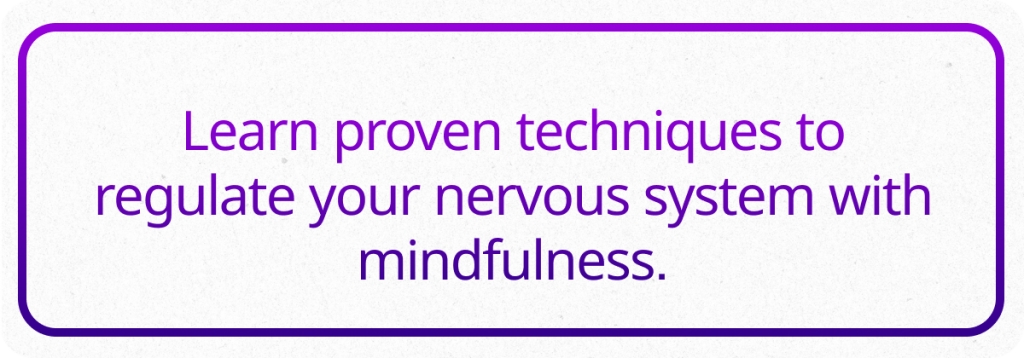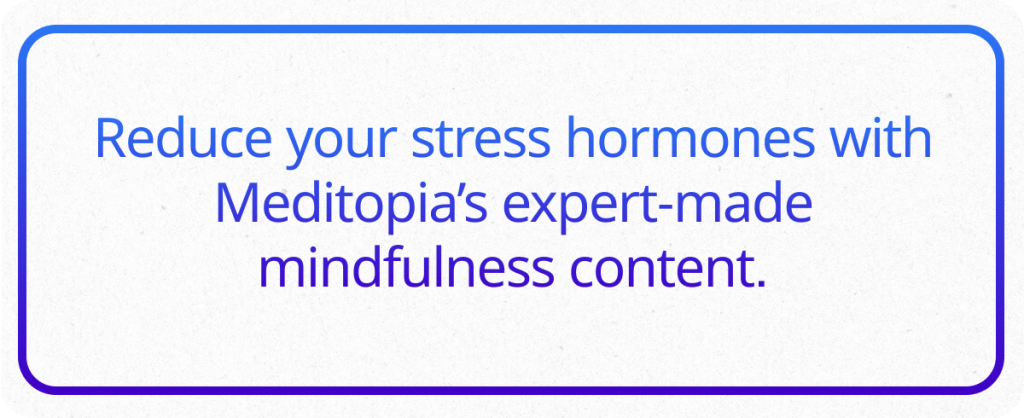How to Regulate Your Nervous System: Practical Tips

Table of contents
Have you ever received bad news and felt a stomachache? How about sweating and trembling before an important event? The constant buzz of modern life can leave us feeling frazzled and overwhelmed, impacting our mental and physical health. This article is dedicated to exploring how to regulate your nervous system when facing anxious situations, offering practical tips and insights to cultivate mental well-being.
If you are ready to learn grounding techniques for anxiety, and how to calm yourself down, keep reading, because this blog is for you.

Nervous System Regulation: Why Is It Important?
Learning how to regulate your nervous system is crucial for maintaining overall well-being and managing the stresses of daily life. It plays a central role in our body’s response to stress, danger, and relaxation.
When our nervous system is out of balance, it can lead to heightened anxiety, irritability, and even physical health issues such as high blood pressure and weakened immune function.
By understanding and actively regulating our nervous system, we gain control over our body’s reactions to stressors. This control enables us to respond more calmly and effectively to challenging situations, reducing the negative impact of stress on our mental and physical health.
Understanding Nervous System Regulation
The Autonomic Nervous System
The autonomic nervous system (ANS) is a complex network of nerves that controls involuntary bodily functions, such as heart rate, digestion, and respiratory rate. It operates without conscious effort, ensuring our body responds appropriately to various stimuli and maintains internal balance or homeostasis.
Differentiating between Sympathetic and Parasympathetic Responses
Within the ANS, there are two main branches: the sympathetic nervous system (SNS) and the parasympathetic nervous system (PNS). The SNS is responsible for the “fight or flight” response, activating during times of stress or perceived danger to prepare the body for action. Conversely, the PNS promotes the “rest and digest” response, facilitating relaxation, digestion, and recovery.
The Impact of Chronic Stress on the Nervous System
Chronic stress can dysregulate the balance between the sympathetic and parasympathetic systems, leading to prolonged activation of the SNS and suppression of the PNS.
This imbalance can have detrimental effects on both physical and mental health, contributing to conditions such as anxiety disorders, depression, cardiovascular disease, and digestive issues.

Grounding Techniques For Anxiety
Now that you understand how your nervous system regulation works, let’s discuss 2 effective and practical grounding techniques for anxiety based on regulating your nervous system.
- Deep Breathing Exercises: Practicing deep, diaphragmatic breathing can activate the body’s relaxation response, slowing down the heart rate and promoting a sense of calm.
- Progressive Muscle Relaxation: This technique involves systematically tensing and relaxing different muscle groups in the body, helping to release physical tension and reduce overall stress levels.
- Mindfulness Meditation: Engaging in mindfulness meditation practices can cultivate awareness of the present moment, allowing you to observe thoughts and sensations without judgment and reduce anxiety.
- Sensory Grounding Exercises: Utilize your senses to bring your focus back to the present. Examples include focusing on the sensation of your breath, noticing sounds in your environment, or observing the texture of an object in your hand.
If you would like to try a breathing exercise for anxiety for free, play our 4-4-4-4 breathing exercise below.
Physical activity is also a powerful way to regulate the nervous system and promote overall well-being. Consider incorporating regular movement and exercise into your routine, such as:
- Cardiovascular exercises like walking, jogging, or cycling to release tension and boost mood.
- Yoga or tai chi, which combine movement with deep breathing and mindfulness to promote relaxation and stress reduction.
- Strength training to build resilience and enhance physical health, which can positively impact mental well-being.
Final Thoughts
Did you learn something new today? We hope you now understand the connection between mind and body, and use mindfulness to improve the well-being of both.
Let’s commit to taking small, consistent steps toward regulating our nervous system and cultivating mental well-being. Together, we can create a life where balance, resilience, and inner peace are the cornerstones of our days.

